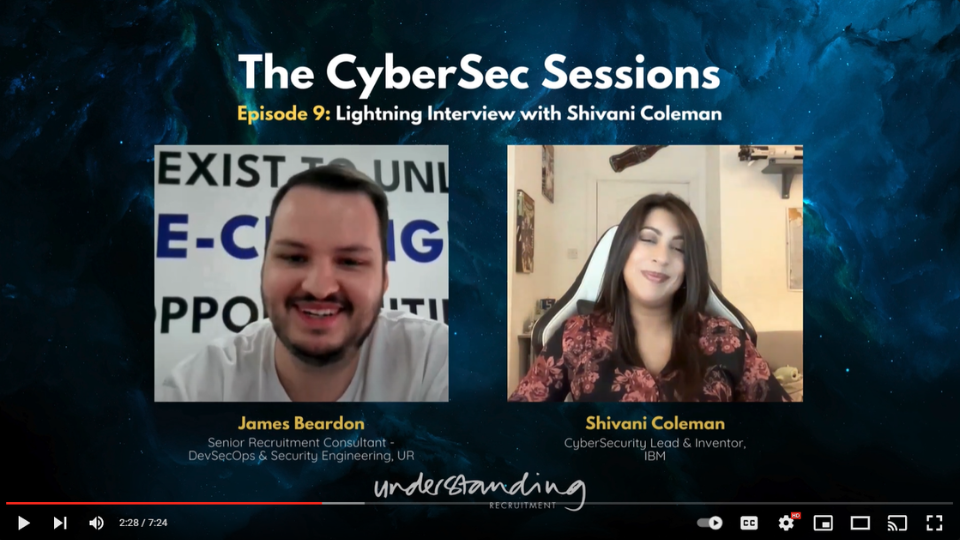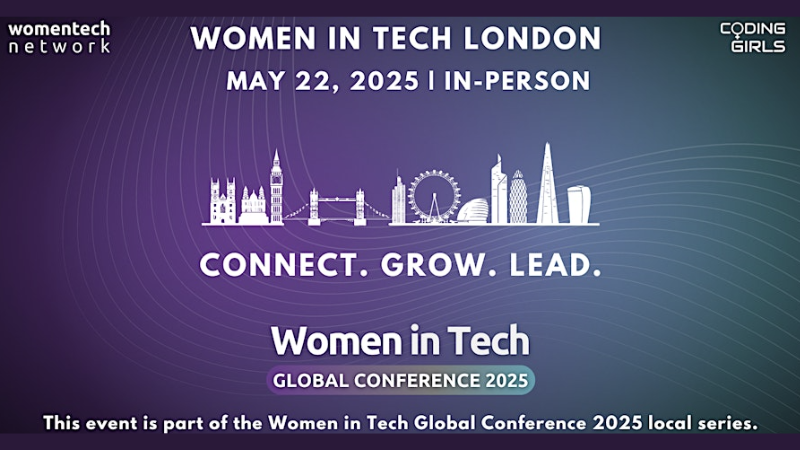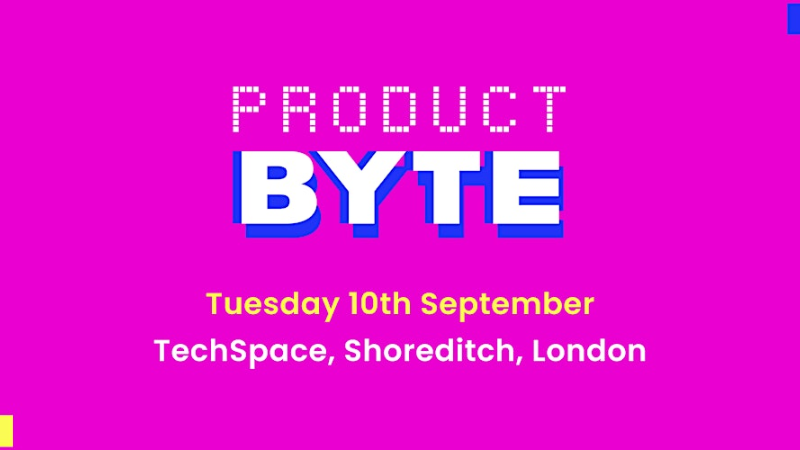From Bias to Breakthroughs: Unveiling Insights from our ‘Invest in Women’ Event
25th March, 2024 6 min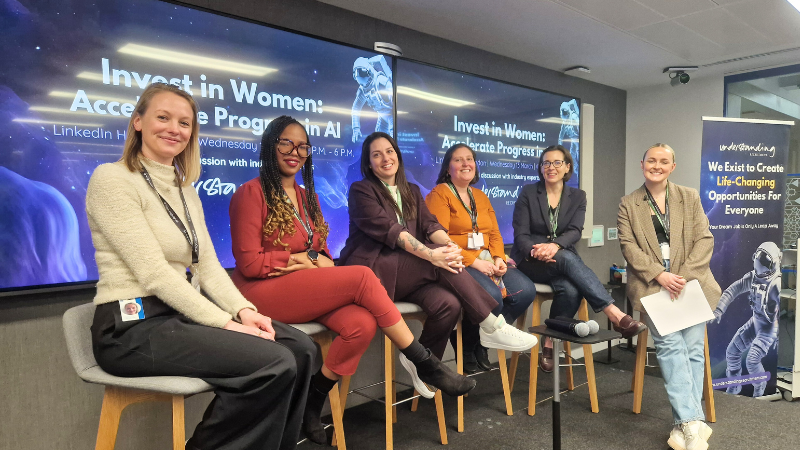
In a rapidly evolving field like Artificial Intelligence, diversity isn’t just a buzzword – it is a necessity for progress. According to a White Paper by Cloverpop, teams that embrace diversity and inclusivity don’t just perform better financially; they also make better decisions 87% of the time and make those decisions twice as fast. It isn’t just the right thing to do; it's vital for unleashing the full potential of our collective intelligence.
With this in mind, Understanding Recruitment recently hosted an event titled ‘Invest in Women: Accelerate Progress in AI’. The overarching theme of the event was to highlight the critical need for reduced gender disparity in the tech industry and how both employers and employees can do their bit to contribute to the change.
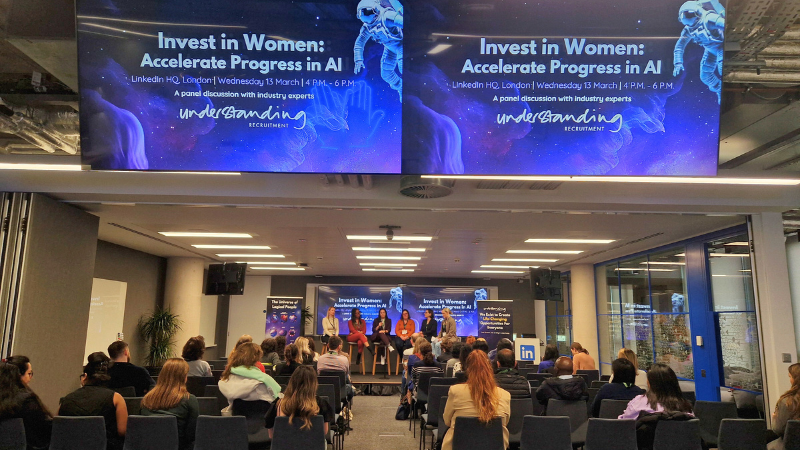
If you’ve taken the time to read this, I assume you understand the importance of discussing this topic. But I wanted to share some statistics that show the level of urgency needed. Did you know that, according to key findings by Forbes, women leave the tech industry at a rate 45% higher than men? It states that this alarming attrition trend not only reflects systemic barriers, but is primarily due to short maternity leaves and a lack of paid leave options. Furthermore, a closer look at leadership roles using LinkedIn Talent Insights, paints a sobering picture: Chief, Heads of, and VPs of Data Science, AI, and Machine Learning are disproportionately male-dominated, with only 19% representation by women in the UK.
This is even prevalent in today’s news, where a recent study mentioned in The Business Standard, launched by the UN’s cultural organisation UNESCO, showed AI tools developed by leading tech companies like OpenAI and Meta to generate sexist content. The study highlights “unequivocal evidence of prejudice against women," particularly in language models (LLMs), showing just how deep-rooted this issue is. These stats represent real experiences and the imperative for change.
However, this is where it gets a little complicated. One of the key challenges we had going into this event, is that there is no universal playbook that can be shared with the world to solve this problem. Each situation is nuanced and requires tailored solutions. We decided that providing an environment for conversations to happen, utilising our network, is how we could most add value.
And what better way to offer personalised advice than through a panel discussion with inspirational women in tech who have been there and done that? Aware that we would have varied seniority in attendance, we curated a panel of women who had successfully navigated the tech landscape, starting from entry-level positions and advancing to leadership roles.
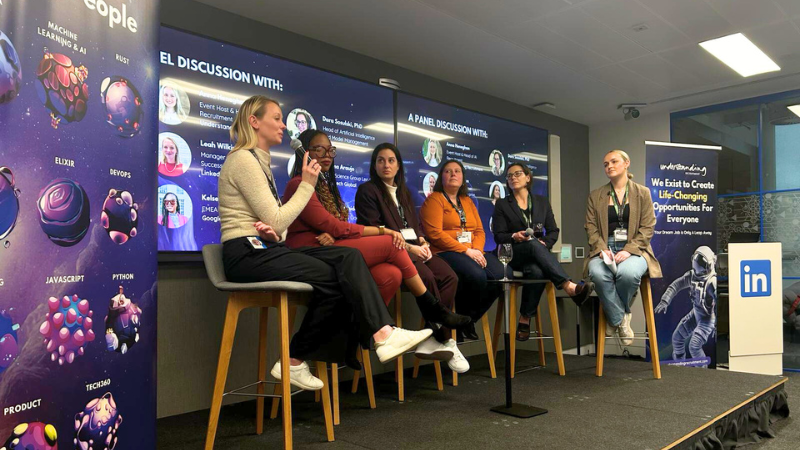
Our panel
Dara Sosulski, PhD – Head of Artificial Intelligence and Model Management at HSBC
Maria Tarasidou – VP of Data & Cloud at shiftavenue
Fatima Araujo – Data Science Group Leader at WiseTech Global
Kelsey Robb – EMEA Community Advisor at Google
Leah Wilkinson – Manager, Customer Success UK Enterprise at LinkedIn
Here are some of our actionable insights and key takeaways:
Actionable Steps for Leaders
1. Diversity and Inclusivity are not synonymous
A diverse team doesn’t automatically translate to an inclusive environment. It’s crucial for hiring managers to introspect and understand their biases – making the unconscious, conscious. Utilising online tests, such as the Implicit Association Test (IAT) developed by Harvard University, and practicing self-awareness can aid this process.
2. Consideration is needed at every step of the process
The initial recruitment process serves as the gateway to your organisational culture. Ensure job advertisements, interview questions, and evaluation criteria are free from gender bias. Implementing ED&I and bias-training workshops can help employees recognise and mitigate effectively. You could even consider implementing blind recruitment processes to primarily focus on skills and qualifications – this has already been seen to be adopted by the likes of the BBC, HSBC, Deloitte, Virgin Money, and KPMG according to CIPHR.
3. Promote Flexibility
Offer some level of flexibility, whether this is differing working hours, the possibility of remote working, or additional support to those with additional responsibilities outside of work. This contributes to ensuring equal opportunities for career advancement and contribution to innovation in the tech sector.
Starling Bank is a prime example of this, having adapted from the rigid structure of the past and embraced flexible working patterns to suit their employees’ individual needs. Whether it is part-time/flexible hours being available for most roles, remote working options, or taking an extra day off for your birthday – they have truly adapted.
Actionable Steps for Those Starting Out
And who better to guide you than those who have done it themselves…
Dara Sosulski, PhD – Head of Artificial Intelligence and Model Management at HSBC
Picking the right manager and getting face time
“Get as much face time with like-minded individuals as you can. You’d be amazed the difference it makes, just having a conversation with someone in person. It is a totally different dynamic and relationship. Picking the right manager is as important as picking the right role, ensure it is someone you can trust and you think will be supportive in your progress.”
Maria Tarasidou – VP of Data & Cloud at shiftavenue
Be your best cheerleader and believe in yourself
“You need to be aware of your surroundings. In reality, being conscious of how you brand yourself and how you advocate for yourself is very difficult. It’s trying to get the balance between being assertive and inspiring, whilst also being respectful, dynamic, and nice – it’s not easy. It takes guts to be yourself. You need to be your best cheerleader by promoting your work no matter what and believe in yourself!”
Leah Wilkinson – Manager, Customer Success UK Enterprise at LinkedIn
Be self-aware so you can up-skill effectively
“Self-awareness is absolutely key, and in my previous role one of the questions we always used to ask in interviews was around strengths and weaknesses, and people would always seem to struggle with weaknesses. So, we positioned it differently and said look, if we were to ask all your friends and family what was wrong with you, what would they say? With that information, you need to make a conscious decision to either focus on these areas of opportunity to improve, or spend the time making your strengths even stronger.”
Fatima Araujo – Data Science Group Leader at WiseTech Global
Explore other opportunities if you’re discontent
“Such a small percentage of women join the tech industry, and a large percentage of those leave after just a few years, this is unfortunate because it is such an exciting industry! My advice would be, it doesn’t matter what obstacles you come across, don’t leave the industry. Look at other opportunities out there and the right company will value you. Nowadays there are many companies invested in building good environments and inclusive teams.”
Kelsey Robb – EMEA Community Advisor at Google
Understand your environment to help you navigate it
"It's important to acknowledge the part office dynamics can have in your career. Seek out advocates who can articulate your ideas even when you're not present, as well as the right sponsors to champion your success. Understanding these dynamics is crucial."
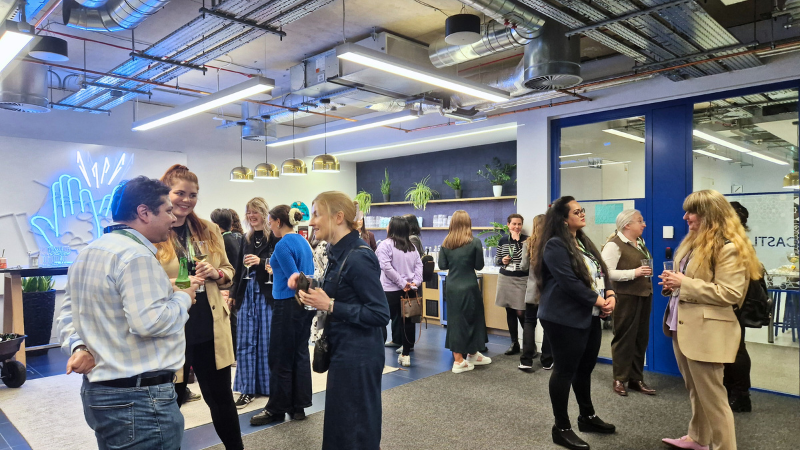
The Importance of Mentorship
When discussing various challenges faced, the value of successful mentorship pairings came up quite often. It can help to address the diverse array of individual circumstances, goals, and challenges whilst offering tailored guidance on a one-to-one basis. Recognising the need for sustainable change beyond this event, we’ve launched the 'UR WISE Network' Mentorship Scheme for Women in Science and Engineering. This initiative aims to provide ongoing support and guidance to women aiming to progress in the tech industry.
If you’re interested in finding out more or would like to get involved as a mentor or mentee please reach out to me cdowsell@understandingrecruitment.com for more details.
As we continue this collaborative journey for change, it is imperative to recognise that progress is achieved through iterative steps. It would be impossible to completely mitigate gender disparity in one evening, as much as we would like to. But this is a step in the right direction, and if you have ideas for future events, we would love to know!
Progress, not perfection.
Discover our commitment to equality and diversity at Understanding Recruitment and learn how we can enhance your hiring initiatives to foster inclusivity and equity.

